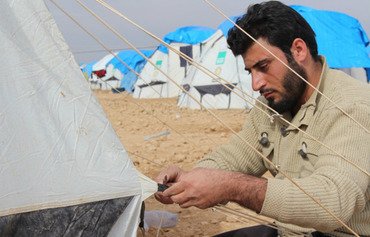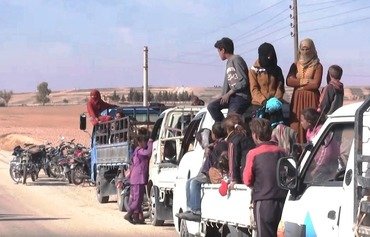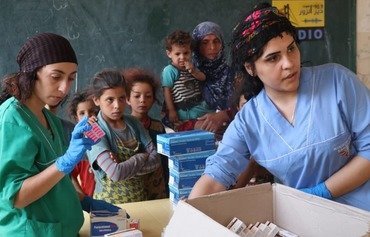Since April, al-Raqa Civil Council (RCC) has been providing critical aid to residents of areas liberated from the "Islamic State of Iraq and Syria" (ISIS) and to internally displaced persons (IDPS) who have fled combat and danger zones.
The council was established on April 18th by the Syrian Democratic Forces (SDF) in the town of Ain Issa, some 50 kilometres north of al-Raqa.
The council provides medical and relief aid, but its 14 permanent committees have been hard pressed to continue their work due to the surge in the number of displaced persons in the wake of the battles to liberate al-Raqa.
The RCC is co-chaired by one man and one woman, and includes three deputy chairs, one of whom must be a woman. The deputies rotate through the posts of secretary, rapporteur and treasurer.
![Al-Raqa Civil Council provides critical aid to those displaced by the 'Islamic State of Iraq and Syria' and the residents of liberated areas. [Photo courtesy of Abdulsalam Hamsourk]](/cnmi_di/images/2017/08/28/9328-Syria-Raqa-aid2-600_384.jpg)
Al-Raqa Civil Council provides critical aid to those displaced by the 'Islamic State of Iraq and Syria' and the residents of liberated areas. [Photo courtesy of Abdulsalam Hamsourk]
Food, medical aid
The council's office of humanitarian organisations "is concerned with all matters relating to IDPs and local residents in the areas administered by the council", bureau director Abdulsalam Hamsourk told Diyaruna.
It provides them with basic food, health care and other essentials, he said, adding that it also sets up camps for IDPs who flee ISIS-controlled areas.
There are no precise figures on the beneficiaries of the office’s services, except for Ain Issa camp, run by the RCC, which currently hosts 8,200 IDPs, he said.
The relief kitchen, which is affiliated with the council, serves daily meals at the camp and distributes 3,200 bundles of bread free of charge, he said.
However, he said, the aid provided by humanitarian organisations for the remaining camps is inadequate.
Most available aid comes from international and local organisations, most of which respond to the requests of the RCC's humanitarian organisations bureau.
These organisations include al-Furat, al-Mawadda, Concern and International Relief and Development, as well as UNHCR, UNICEF, Save the Children and Bihar Relief, among others.
"On the medical side, we have co-operation with the Kurdish Red Crescent and the French and Dutch branches of Doctors Without Borders (MSF)", Hamsourk said.
Volunteers work around the clock
The RCC's health committee is entirely comprised of volunteers, committee chairman Saddam al-Huwaidi told Diyaruna.
"We are volunteers working around the clock to provide the most modest services to residents of the liberated areas and areas yet to be liberated," he said.
The committee oversees health facilities in liberated areas of rural al-Raqa, and comprises six members of various specialisations, including doctors, pharmacists and administrators, he said.
The committee co-ordinates with international medical and non-medical organisations to serve the residents of al-Raqa, he added.
"We provided them with a field study on the situation in rural al-Raqa, including the feasibility of repairing damaged [medical] centres and key emergency care stations," he said.
This looked at the feasibility of training medical cadres, including doctors, nurses and paramedics, in order to staff those centres, he said.
Unfortunately, support from international organisations has been limited, al-Huwaidi said.
Because of this the committee, with its staff of highly experienced doctors and nurses, opened most of the medical and emergency care centres voluntarily, to meet the urgent needs in these areas, he said.
"The committee on August 17th concluded a polio vaccine campaign conducted in co-operation with the World Health Organisation (WHO) and UNICEF, during which about 105,000 children were vaccinated," al-Huwaidi said.
There have been outbreaks of diseases, including Leishmaniosis, typhoid fever and chickenpox, he said, adding that he is "sounding the alarm and demanding that the world shoulder its responsibility towards our people".
"The committee also is suffering from lack of emergency care stations close to the central care centre, and has an urgent need for a field hospital," he said.
Massive influx of displaced civilians
Ayed al-Issa, 50, a farmer from rural al-Raqa who currently resides in Ain Issa camp, said when the fighting intensified he was forced to flee with his family to safe areas controlled by the SDF.
"Al-Raqa Civil Council co-ordinated our arrival and moved us into a camp where we were provided a tent to stay in, daily hot meals and some aid that is distributed from time to time by some organisations" under the supervision of the council, he told Diyaruna.
"The pressure resulting from the surge in the number of IDPs arriving in the camp sometimes causes a slow down in the delivery of aid," al-Issa said.
Some IDPs who have relatives in the area help the families in need by complementing the efforts of the al-Raqa Civil Council, he added.

![Al-Raqa Civil Council facilitates the delivery of food and aid to residents of areas liberated from the 'Islamic State of Iraq and Syria'. [Photo courtesy of Abdulsalam Hamsourk]](/cnmi_di/images/2017/08/28/9327-Syria-Raqa-aid-600_384.jpg)






